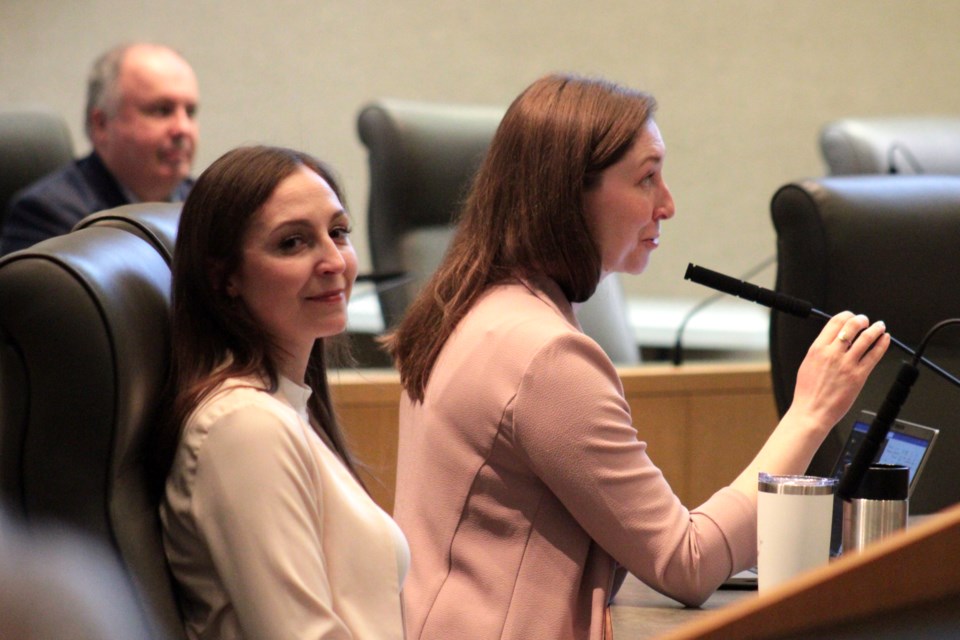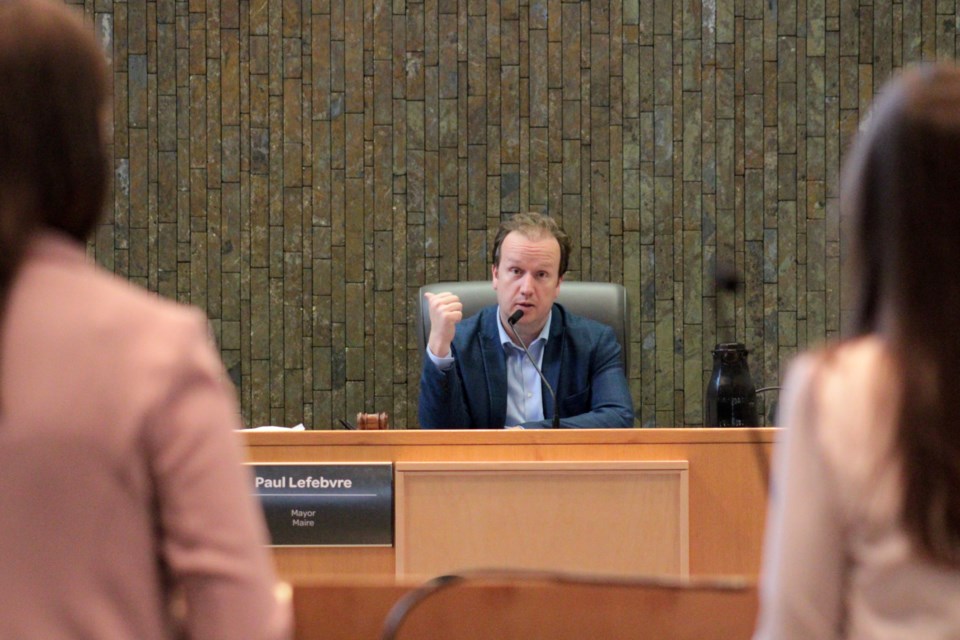Last year’s Future-Ready Development Services Ad-Hoc Committee of city council yielded 54 calls for action intended to help spur economic development in Greater Sudbury.
“Lots of calls for action, and staff is collaborative, and community members have been collaborative as we take it to the next steps,” Mayor Paul Lefebvre told Sudbury.com after last week's meeting.
“Now, it’s communicating all these changes and calls for action for the public,” he added. “This is a new way of doing things, and I look forward to ongoing discussions and ongoing results.”
City performance and change manager Renee Higgins and mayor’s office public policy and communications co-ordinator Raili Lakanen presented these calls for action during Wednesday’s meeting, and staff were asked to draft responses to each of them by September.
Staff have already adopted or are working to adopt many of the calls for action, city Planning Services Director Kris Longston told the committee.
“I wasn’t surprised by anything, but it is always a give and take with respect to development, and staff do have to work within the legislation that governs the work we need to do,” he said, adding that there’s sometimes little room for interpretation.

Following through on a pledge Lefebvre made during an event with the Northeastern Ontario Construction Association, the ad-hoc committee formed last year to tackle economic growth.
At the time, Lefebvre described its purpose as having “witnesses come forward to us to testify and share their practices and their insights.”
City Performance and Change Manager Renee Higgins told the committee that staff also interviewed people at other municipalities, gathered reports, sought public feedback and jotted down insights from industry insiders who weren’t comfortable speaking publicly.
Sudbury.com attended a series of the committee's meetings last year, where industry insiders shared insights with members in an open forum within council chambers at Tom Davies Square.
“More in-person opportunities are needed” between city staff and developers, Bélanger Salach Architecture partner Amber Salach told the committee, pulling Place des Arts as an example of municipal shortcomings.
It took seven site-plan submissions being handed to the city until one was finally improved, which she said took 12 months and could have been fast-tracked with better communication from the city.
Sudbury Real Estate Board member Chris Tammi pushed for more incentives for residential builds, while Tulloch Engineering project manager Kevin Jarus suggested the city should invest more into talent attraction, since professionals are in short supply in various fields and might not know how affordable Sudbury is compared to Toronto.
Local lawyer Andrée Lacroix urged the city to empower front-line staff, arguing there’s no reason “top guys” at city hall should be dealing with minor applications like deck permits.
Relaying insights from the calls for action, mayor’s office Public Policy and Communications Co-ordinator Raili Lakanen told the committee that some noted a “bottleneck when it comes to the point of making a decision, with some delegations saying they had to wait for a long period of time on an answer or decision to be made because the person they were dealing with didn’t seem to be empowered or have the authority or ability to make that final determination.”
Many of these concerns recommendations made their way into the 54 calls for action, with the call for action No. 27 calling for giving staff more delegated authority.
Although limited response was afforded to the calls for action on Wednesday, city CAO Ed Archer tackled that one, noting that although some city staff might have the delegated authority to make decisions but ask managers to pull the trigger anyway.
“A ‘yes’ or ‘no’ is welcome to some stakeholders and entirely unwelcome to others,” he said, adding that staff might not want to live with a decision’s negative consequences, which come out on social media and other settings.
“Those decisions have legs and can create a lot of negative results for the individual person, not just the organization.”
The city is working to train supervisors on appropriate steps to take when delegating responsibilities to staff and working with staff on the “cultural element” to decision-making.
“It is largely building a comfort level with the organization's risk tolerance and the reality that none of these choices tend to be black and white,” Archer added.
City of Greater Sudbury staff have been directed to provide a report to the committee by Sept. 30 responding to the 54 calls for action. They’ve been asked to comment on the feasibility and legislative ability to follow through on the calls for action, provide an implementation plan and a schedule for addressing each element in the plan.
For the full report and a breakdown of calls for action, click here.
The 54 calls for action include:
The Foundation: We are in this together
- Revise corporate approach to risk management regarding development
Theme 1: Clarity and consistency in messaging
- Council to publicly support staff
- Mayor to have quarterly updates with senior staff
- Council to clearly identify their own rubric of success
- Continue to publish real-time data and benchmark updates
- Share stories of success and good news
- Highlight new programs, policies, and legislative changes that affect the development process
- Create a series of plain language guides
- Create a simple document outlining roles, expectations, and rules of engagement
Theme 2: Transparent and Customer-Focused Process
- Develop measures of success that include customer satisfaction and relationships
- Institute a primary point of contact for each large development project file
- Have a public-facing, cross departmental development navigator at One-Stop Services counter
- Expand evening or weekend availability of staff
- Create a clear dispute resolution or complaints process
- Create an app that asks users questions and directs them to the resources and answers they need
- Create online training videos for Pronto
- Improve visibility and tracking of the application progress on Pronto
- Increase digital notes on each file
- Increased collaboration with Conservation Sudbury
- Have senior staff continue to participate in SPART
(Sudbury Planning Application Review Team) - Comments to clearly differentiate between requirements and recommendations
- Implement Financial Incentives for Closing Permits
- Apply an amnesty period to open permits or for past work on property
- Reconfigure Development Liaison Advisory Panel format and include Councillors in membership
- Mayor to hold open meetings with development professionals twice a year
- Clearly communicate that large project proponents may request in-person meetings
Theme 3: Staff Empowerment and Internal Co-ordination
- Where appropriate, give staff more delegated authority
- Staff to keep up with online training modules available to the public
- Quarterly meetings for managers across departments engaged in development
- Annual staff engagement sessions
- Increase Professional Engineer coverage
- Create Junior Planner staff position
Theme 4: Continuous Improvement
- Mayor to call special meetings of Council and/or Planning Committee, if required
- Continue to offer conditional permits
- Encourage the use of the Hold symbol
- Institute third party review of large projects and tenders
- Revise supplemental contract terms to share liability
- Continue to review and consolidate zoning bylaws annually
- Capacity for ongoing policy review and integration
Theme 5: Alignment with Broader Economic Development Goals
- Planning Services, Building Services, and Economic Development to work together in one Division
- Director of Planning and Chief Building Official meet with GSDC Board of Directors twice a year
- Create a Mayor’s Acceleration team to support large projects
- Create Business Retention & Expansion Red Flag team
- Continue with attraction marketing campaigns, champion immigration programs, and partner with post-secondary institutions
- Temporary housing solutions for newcomers and skilled workers
- Review rural lands as potential site for increased employment districts
- Continue to offer CIP TIEGs (Community Improvement Plan Tax Increment Equivalent Grant) or other incentives for multi-residential and purpose-built affordable rental
- Continue to coordinate infrastructure upgrades (and funding asks) to support housing development in strategic areas
- Create and promote a municipal assistance program to incentivize secondary unit to home
- Adjust mill rate for purpose-built multi-residential
- Enhance grants for downtown office conversions
- Continue with Land banking strategy
- New TIEGs to address Greater Sudbury-specific challenges
- Review tax policy and possible introduction of new fees
Tyler Clarke covers city hall and political affairs for Sudbury.com.




